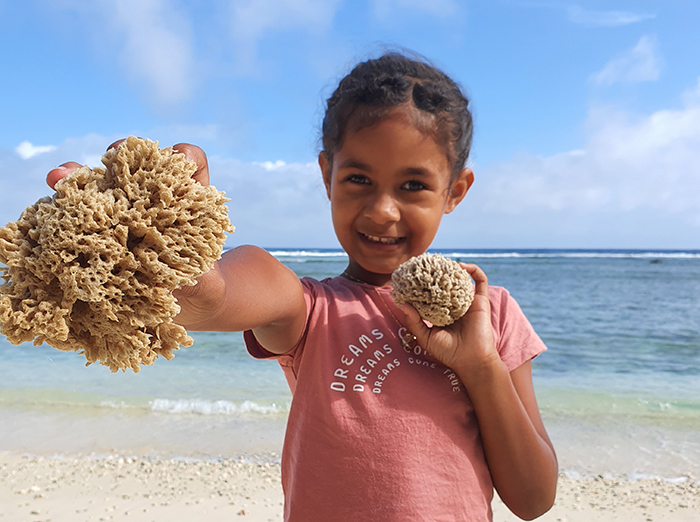Sea sponges as an organic industry
Saturday 15 October 2022 | Written by Te Ipukarea Society | Published in Opinion

The Pacific bath sponge, Coscinoderma mathewsi used by a local resident going on 15 years now. TIS/22101424
Much of the world we live in today is made of plastic. This western influenced product that we have come to rely so heavily on is the polar opposite of our traditional organic rito crafts and raurau plates that naturally break down over time.
The convenience of plastics, being so durable and resilient, has led to their proliferation around the world, creating an eternal rubbish problem for our land and oceans.
We rely so much on plastics, that it is now much more commonly used in our day to day lives than most of us realise.
From making up the plastic sticks in our earbuds or toothbrushes with plastic handles and nylon bristles, plastics are also found in the dishwashing sponges we use in the Cook Islands.
Taking a stroll down the cleaning product aisle of our shops, we are limited with very few eco-friendly options.
The majority of sponges available are made mostly or entirely of plastics. Plastic made sponge products that over time disintegrate into microplastics stuffing up our drainage systems, making their way into our marine environment, and even entering our bodies through the food we eat and liquids we drink.
In an attempt to shift behaviours away from using so many plastic riddled products, the organic industry is now starting to provide ecofriendly alternatives that are better suited to our environment and are of better quality, lasting for longer periods of time.
For example, the sustainable harvesting of natural sea sponges is an industry that has been practiced in the Western Pacific for many years.
Sea sponges which can be found in the coldest arctic seas to the warmest tropical oceans are actually animals, not plants or corals.
They are found attached to the ocean floor or the coral reef.
Sea sponges feed on microscopic organisms as they filter out water, giving them that natural old school holey spongy appearance.
Unfortunately, when sea sponges are harvested from the marine environment they do die.
However, they do retain their spongy structure which is ideal for both dishwashing use and shower body washes.
This concept however still does not always sit soundly with vegans as their values do not line up with killing animals for any reason.
There are definitely positives to the use of sea sponges for cleaning. They are biodegradable, durable, absorbent, non-toxic, hypoallergenic, and renewable when harvested sustainably.
Reports have also found that sustainably harvested sea sponges for household use have less of an impact on the stocks of the species being removed than the impacts septic waste and dredging have on these populations.
In recent years, researchers have also discovered that the value of sea sponges goes beyond their natural cleaning benefits, as they also have medicinal uses too.
This includes their use in drugs that treat viral infections as well as treating a variety of cancers.
A new species of sponge was recently found at the depth of 4000 metres in the central Pacific Ocean, living on polymetallic nodules, the very nodules we are wanting to mine in our waters.
It could very well be possible that the new sponge species ‘Plenaster craigi’ and others yet to be discovered, could hold medicinal properties just waiting to be better understood and studied.
A quick search on the Cook Islands Natural Heritage Database shows the Cook Islands has a variety of native sponge species currently only known to be found on Rarotonga.
There are definitely more unrecorded sponge species waiting to be found in our waters, both within our lagoons, around our coastal reefs, and in the deep sea.
At the moment natural sea sponges are not readily available for sustainable harvest locally or within our shops.
However, there are ecofriendly alternatives available on the island.
These include the use of simple dishcloths which are made of bamboo, recycled cotton, organic linen, organic hemp or TENCEL lyocell.
Avoid unsustainable fabrics like conventional cotton, polyester, nylon, rayon and acrylic.
For more local solutions that support zero waste cultures visit our webpage www.tiscookislands.org.














































